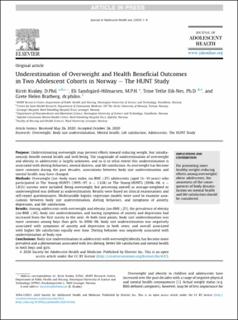| dc.description.abstract | Purpose: Underestimating overweight may prevent efforts toward reducing weight, but simultaneously benefit mental health and well-being. The magnitude of underestimation of overweight and obesity in adolescents is largely unknown, and so is to what extent this underestimation is associated with dieting behaviors, mental distress, and life satisfaction. As overweight has become more common during the past decades, associations between body size underestimation and mental health may have changed. Methods: Overweight (isoebody mass index, iso-BMI 25) adolescents (aged 13e19 years) who participated in The Young-HUNT1 (1995e97, n ¼ 1,338) or The Young-HUNT3 (2006e08, n ¼ 1,833) surveys were included. Being overweight, but perceiving oneself as average-weighted or underweighted was defined as underestimation. Results were based on clinical examinations and self-report questionnaires. Multivariable logistic regression models were used to examine associations between body size underestimation, dieting behaviors, and symptoms of anxiety, depression, and life satisfaction. Results: Among adolescents with overweight and obesity (iso-BMI 25), the prevalence of obesity (iso-BMI 30), body size underestimation, and having symptoms of anxiety and depression had increased from the first survey to the next. At both time points, body size underestimation was more common among boys than girls. In 2006e08, body size underestimation was negatively associated with symptoms of anxiety and depression in both sexes, and overall associated with higher life satisfaction equally over time. Dieting behavior was negatively associated with underestimation of body size. Conclusions: Body size underestimation in adolescents with overweight/obesity has become more prevalent and a phenomenon associated with less dieting, better life satisfaction and mental health in both boys and girls. | en_US |

